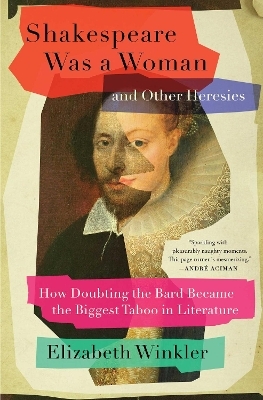
Shakespeare Was a Woman and Other Heresies
How Doubting the Bard Became the Biggest Taboo in Literature
Seiten
2024
Simon & Schuster (Verlag)
978-1-9821-7127-8 (ISBN)
Simon & Schuster (Verlag)
978-1-9821-7127-8 (ISBN)
A delightful romp through the Shakespeare authorship question, exploring how doubting that William Shakespeare wrote the plays attributed to him became the greatest taboo in literature… and who the Bard might really be.
An “extraordinarily brilliant” and “pleasurably naughty” (André Aciman) investigation into the Shakespeare authorship question, exploring how doubting that William Shakespeare wrote his plays became an act of blasphemy…and who the Bard might really be.
The theory that Shakespeare may not have written the works that bear his name is the most horrible, unspeakable subject in the history of English literature. Scholars admit that the Bard’s biography is a “black hole,” yet to publicly question the identity of the god of English literature is unacceptable, even (some say) “immoral.”
In Shakespeare Was a Woman and Other Heresies, journalist and literary critic Elizabeth Winkler sets out to probe the origins of this literary taboo. Whisking you from London to Stratford-Upon-Avon to Washington, DC, she pulls back the curtain to show how the forces of nationalism and empire, religion and mythmaking, gender and class have shaped our admiration for Shakespeare across the centuries. As she considers the writers and thinkers—from Walt Whitman to Sigmund Freud to Supreme Court justices—who have grappled with the riddle of the plays’ origins, she explores who may perhaps have been hiding behind his name. A forgotten woman? A disgraced aristocrat? A government spy? Hovering over the mystery are Shakespeare’s plays themselves, with their love for mistaken identities, disguises, and things never quite being what they seem.
As she interviews scholars and skeptics, Winkler’s interest turns to the larger problem of historical truth—and of how human imperfections (bias, blindness, subjectivity) shape our construction of the past. History is a story, and the story we find may depend on the story we’re looking for.
“Lively” (The Washington Post), “fascinating” (Amanda Foreman), and “intrepid” (Stacy Schiff), Shakespeare Was a Woman and Other Heresies will forever change how you think of Shakespeare…and of how we as a society decide what’s up for debate and what’s just nonsense, just heresy.
An “extraordinarily brilliant” and “pleasurably naughty” (André Aciman) investigation into the Shakespeare authorship question, exploring how doubting that William Shakespeare wrote his plays became an act of blasphemy…and who the Bard might really be.
The theory that Shakespeare may not have written the works that bear his name is the most horrible, unspeakable subject in the history of English literature. Scholars admit that the Bard’s biography is a “black hole,” yet to publicly question the identity of the god of English literature is unacceptable, even (some say) “immoral.”
In Shakespeare Was a Woman and Other Heresies, journalist and literary critic Elizabeth Winkler sets out to probe the origins of this literary taboo. Whisking you from London to Stratford-Upon-Avon to Washington, DC, she pulls back the curtain to show how the forces of nationalism and empire, religion and mythmaking, gender and class have shaped our admiration for Shakespeare across the centuries. As she considers the writers and thinkers—from Walt Whitman to Sigmund Freud to Supreme Court justices—who have grappled with the riddle of the plays’ origins, she explores who may perhaps have been hiding behind his name. A forgotten woman? A disgraced aristocrat? A government spy? Hovering over the mystery are Shakespeare’s plays themselves, with their love for mistaken identities, disguises, and things never quite being what they seem.
As she interviews scholars and skeptics, Winkler’s interest turns to the larger problem of historical truth—and of how human imperfections (bias, blindness, subjectivity) shape our construction of the past. History is a story, and the story we find may depend on the story we’re looking for.
“Lively” (The Washington Post), “fascinating” (Amanda Foreman), and “intrepid” (Stacy Schiff), Shakespeare Was a Woman and Other Heresies will forever change how you think of Shakespeare…and of how we as a society decide what’s up for debate and what’s just nonsense, just heresy.
Elizabeth Winkler is a journalist and book critic whose work has appeared in The Wall Street Journal, The New Yorker, The New Republic, The Times Literary Supplement, and The Economist, among other publications. She received her undergraduate degree from Princeton University and her master’s in English literature from Stanford University. Her essay “Was Shakespeare a Woman?”, first published in The Atlantic, was selected for The Best American Essays 2020. She lives in Washington, DC.
| Erscheinungsdatum | 24.02.2024 |
|---|---|
| Zusatzinfo | 1-c photos t-o |
| Verlagsort | New York |
| Sprache | englisch |
| Maße | 140 x 213 mm |
| Gewicht | 320 g |
| Themenwelt | Literatur ► Biografien / Erfahrungsberichte |
| Kunst / Musik / Theater | |
| Sachbuch/Ratgeber ► Geschichte / Politik | |
| ISBN-10 | 1-9821-7127-8 / 1982171278 |
| ISBN-13 | 978-1-9821-7127-8 / 9781982171278 |
| Zustand | Neuware |
| Haben Sie eine Frage zum Produkt? |
Mehr entdecken
aus dem Bereich
aus dem Bereich
Caspar David Friedrichs Reise durch die Zeiten
Buch | Hardcover (2023)
S. Fischer (Verlag)
CHF 34,95


